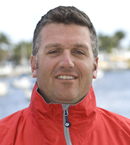
|
|
Dean Brenner: Making Changes (July 12, 2010) Last week the U.S. Olympic Sailing Committee (OSC) announced it was discarding their tried and true, winner-take-all trials regatta used for the selection of Olympic sailing representatives, and instead will use the results from two prominent events that would place American sailors competing against the best international competitors in the world. Scuttlebutt spoke with OSC chairman Dean Brenner about the change: DMB: I really canít comment on the specifics of how other sports under U.S. Olympic Committee (USOC) do their selection. I can only comment on what our committee thinks is best for sailing, and we think this selection process gives us the best chances for success. DMB: Technically, we could propose a subjective system, and USOC might approve it. But philosophically we don't like such a system and never seriously considered it. DMB: The essential answer is "none." We always confer with USOC on our Trials selection process and we did this time as well. Their guidance is highly valuable to us. But in terms of specific conditions, USOC charges us with designing a system that is fair and will produce our most competitive team in 2012, which is exactly the guidance they give to all other Olympic sports in the USA. DMB: There were no additional stipulations based on the 2007 Trials. But practically speaking, no one wants to have the results of their event in dispute whether we are talking about the Trials or your yacht club Wednesday night series. Did we learn some things from 2007? Of course we did, and it would disingenuous to suggest otherwise. But the only real stipulation (always in effect and not just this time) is that we comply with, among other documents, the Racing Rules of Sailing (RRS), and obviously the 2007 Trials had an impact on the RRS. DMB: We discussed this thoroughly and came to the unanimous decision that choosing all of our representatives based on international competition would produce the strongest team, across the board. And this decision is entirely consistent with previous changes with our funding and our annual selection to the U.S. Sailing Team AlphaGraphics... everything we do comes back to international competition. To win a medal you have to beat the best in the world. So that is the environment we chose for our Trials. DMB: It was a simple scheduling issue. The 2011 RMOCR was too early in the cycle to be part of the final Trials selection, and the 2012 RMOCR will be too close to the 2011 Perth Worlds to guarantee deep fleets. We are concerned that some teams and sailors will skip Miami in 2012 because the timing of the Perth Worlds. We chose Weymouth SFG because we want to have some selection at the Olympic venue, and the ISAF Worlds because it will be an Olympic Qualifier with deep fleets. Furthermore, any serious contender for a medal in 2012 was going to be at these two events anyway, so we don't believe we added any additional burden to any athlete who has a legitimate chance at Games success. DMB: In reality, the Trials is more than two events for the 9 fleet racing events. The qualification series for spots in Weymouth is four events long, so the Trials process will start in January 2011 in Miami and conclude in December 2012 in Perth. DMB: No. We think the race management in Weymouth and Perth will be excellent. DMB: In actuality, we will have final team selection in December 2011 in the nine fleet racing events, only two months later than the October 2007 Trials. We consider this early enough to have the same positive impacts that many of our athletes noted after early selection for 2008 (Note: The 2012 Summer Olympic Games are scheduled from 27 July to 12 August 2012). back to top |







|


